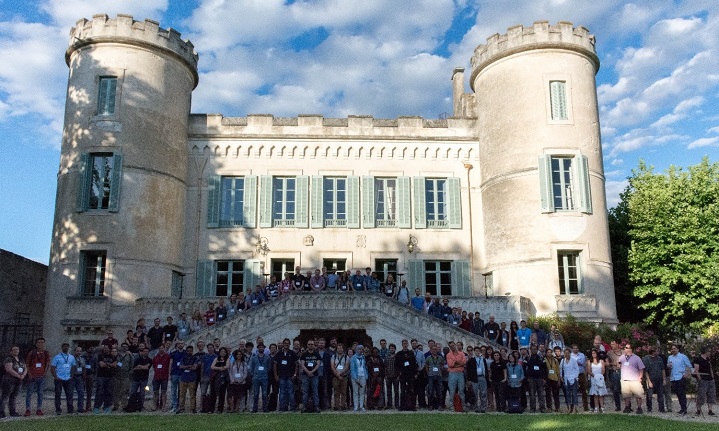Intergalactique – the Galaxy Community Conference 2017
| 31 July, 2017 | Hollydawn Murray |
|

|
Hollydawn Murray gives us a run down of this year's Galaxy Community Conference

Photo credit: Bérénice Batut
The Galaxy Community Conference (GCC2017), held in Montpellier, France last month, brought together a vibrant group of developers, system administrators, and scientists working in data-intensive biomedical research. Alongside haute cuisine worthy of a Michelin star, at least on the conference circuit, the week included keynotes and accepted talks, poster sessions, demos, hacks, workshops, birds-of-a-feather meetups, and a plethora of networking opportunities.
The conference began with a history of Galaxy (PDF), born from a 50,000 line Perl script, as told by Anton Nekrutenko (Penn State University) and James Taylor (Johns Hopkins University), which led into 2 days of talks ranging in topic from new tools to training.
In case you missed it, we’ve outlined some of the highlights here. You can also view posters and slides presented at GCC2017 in our Galaxy Gateway.
Genomics and beyond
The poster sessions at GCC2017 served to emphasise the diversity of its applications. Galaxy is in heavy use at Institut Pasteur, as outlined in a poster by Fabien Mareuil and colleagues, with more than 472 tools, 613 users, and 48,000 jobs. A poster from Lemuel J. Racacho (Newborn Screen Ontario) brought attention to Galaxy’s potential in clinical settings; a local Galaxy server was used to visualise quality control checkpoints as a part of an NGS pipeline.
The conference also had a strong focus on training and education. Bérénice Batut (University of Freiburg) spoke about the recent efforts of Galaxy Training Network (GTN) to set up a new open, collaborative online model for bioinformatics training material. The material is available on GitHub but also from ELIXIR’s TeSS portal. The GTN was also mentioned later when Mallory Freeberg (Johns Hopkins University) presented her work on analysis of small RNAs in Galaxy. In addition to outlining the steps of small RNA-seq analyses, Mallory helpfully linked to the GTN tutorial.
The talks also extended to infectious disease: Peter van Heusden (South African National Bioinformatics Institute) spoke about the use of Galaxy in Tuberculosis data analysis and surveillance.
Does ToolDog get along with GalaxyCat?
Stephanie Le Gras and Julien Seiler (IGBMC) used their time to talk about GalaxyCat—a discovery tool that combines EDAM and Galaxy APIs enabling users to quickly search for available tools across Galaxy instances. Smiles were shared amongst the audience following the witty question: does ToolDog get along with GalaxyCat? ToolDog referring to the Tool DescriptiOn Generator presented as a poster by Kenzo-Hugo Hellion and colleagues. ToolDog generates Galaxy XML and CML tool descriptions annotated using metadata from bio.tools.
GalaxyCat wasn’t the only mention of EDAM at GCC2017; EDAM’s Galaxy integration and its use by bio.tools, Debian Med, and the Common Workflow Language was highlighted in a poster presented by Hervé Ménager and colleagues.
And, of course, this coverage would not be complete without mention of the hacks. As aptly reported by Anthony Bretaudeau (INRA) and Coppens Frederik (VIB-UGent), ‘Hack the Galaxy’ helped further build the Galaxy community with 80 participants and a whopping 55 pizzas.
Another dimension
And while conference enthusiasm often tends to wain on the final afternoon, GCC continued to excite. In the brief moment following the final lightening talk, Enis Afgan (Johns Hopkins University) announced the first launch of Galaxy on Microsoft Azure. And it didn’t end there: Dave Clements (Johns Hopkins University) announced GCC2018 will be held in unison with the Bioinformatics Open Source Conference (BOSC2018) and feature joint and parallel sessions, shared keynotes, poster and demo sessions, and social events. Watch out Portland!

|




User comments must be in English, comprehensible and relevant to the post under discussion. We reserve the right to remove any comments that we consider to be inappropriate, offensive or otherwise in breach of the User Comment Terms and Conditions. Commenters must not use a comment for personal attacks.
Click here to post comment and indicate that you accept the Commenting Terms and Conditions.